- Serbia
Get to know Serbia
- Citizens
Culture and science
Health services
Pension and disability insurance
- Business
Employment
Economy
- Media
- Government
- Contact
Keep in touch
Contact form
Back
Keepin touch
Whether you have a question, comment, suggestion or any problem in the purview of the government, send us your message and we will try to respond as soon as possible. If your problem is not in our purview, we will forward your message to the relevant institution.
Q:
A:
Dragutinovic talks with IMF, World Bank representatives
Belgrade/Istanbul,
5 October 2009
Minister of Finance Diana Dragutinovic, who is attending the World Bank and IMF’s annual session, met today with World Bank Vice-President for Europe and Central Asia Philippe le Houerou.
The Ministry says in a statement that they voiced their mutual pleasure at the volume of their cooperation so far and looked at the models for future cooperation, as well as the World Bank’s role in the crisis aftermath.
Houerou welcomed the Serbian government’s strong commitment to reforms voicing the World Bank’s readiness to continue providing financial assistance to Serbia’s budget and infrastructure projects, as well as technical assistance.
He also announced the session of the World Bank Board at which $200 million will be approved as support for the Serbian budget. The only condition Serbia will have to fulfil is to sign a programme with the IMF.
Dragutinovic and Houerou agreed that the recession has ended, though the period of recovery is going to be slow and difficult.
Dragutinovic took the opportunity to present Serbia’s plan for continuing talks with the IMF.
The World Bank believes that chances for continuing talks with the IMF are favourable and that the IMF may be flexible as to the amount of the deficit, although it may be more adamant when it comes to the credibility of reforms.
They agreed that reforms must yield visible results in 2010, and especially in the period after that year.
Minister Dragutinovic also met with Director of the IMF’s Fiscal Affairs Department Carlo Cotarelli and discussed technical assistance which the IMF is providing to Serbia, as well as possibilities for continuing this cooperation.
Dragutinovic stressed that the IMF’s assistance in areas such as tax collection and assessment of the tax system’s efficiency could be invaluable, as well as their recommendations for cutting down the public sector and public spending.
Cotarelli voiced the IMF’s readiness to positively respond to this request by the Ministry of Finance, stressing that the first news can be expected within two to three weeks, the statement adds.
Houerou welcomed the Serbian government’s strong commitment to reforms voicing the World Bank’s readiness to continue providing financial assistance to Serbia’s budget and infrastructure projects, as well as technical assistance.
He also announced the session of the World Bank Board at which $200 million will be approved as support for the Serbian budget. The only condition Serbia will have to fulfil is to sign a programme with the IMF.
Dragutinovic and Houerou agreed that the recession has ended, though the period of recovery is going to be slow and difficult.
Dragutinovic took the opportunity to present Serbia’s plan for continuing talks with the IMF.
The World Bank believes that chances for continuing talks with the IMF are favourable and that the IMF may be flexible as to the amount of the deficit, although it may be more adamant when it comes to the credibility of reforms.
They agreed that reforms must yield visible results in 2010, and especially in the period after that year.
Minister Dragutinovic also met with Director of the IMF’s Fiscal Affairs Department Carlo Cotarelli and discussed technical assistance which the IMF is providing to Serbia, as well as possibilities for continuing this cooperation.
Dragutinovic stressed that the IMF’s assistance in areas such as tax collection and assessment of the tax system’s efficiency could be invaluable, as well as their recommendations for cutting down the public sector and public spending.
Cotarelli voiced the IMF’s readiness to positively respond to this request by the Ministry of Finance, stressing that the first news can be expected within two to three weeks, the statement adds.
-
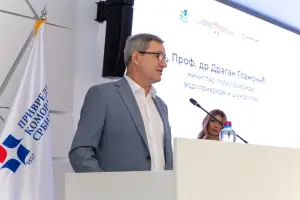 Belgrade, 11 August 2025
Belgrade, 11 August 2025Support for agricultural projects worth RSD 750 million
-
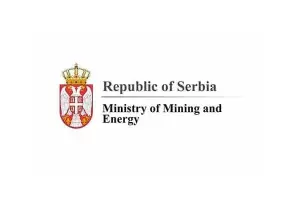 Belgrade, 21 July 2025
Belgrade, 21 July 2025Construction of oil pipeline with Hungary to begin early next year
-
 Belgrade/Athens, 17 July 2025
Belgrade/Athens, 17 July 2025Serbia continues to align with EU in field of energy
-
 Kostolac, 14 July 2025
Kostolac, 14 July 2025First solar power plant Petka in Kostolac put into trial operation
-
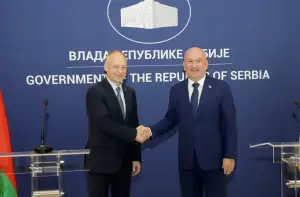 Belgrade, 11 July 2025
Belgrade, 11 July 2025Potential for improving cooperation with Belarus in many areas
-
 Požega, 5 July 2025
Požega, 5 July 2025Section of Pakovraće - Požega highway officially opened
-
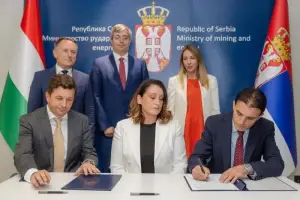 Belgrade, 2 July 2025
Belgrade, 2 July 2025Technical specifications defined for Serbia-Hungary oil pipeline
-
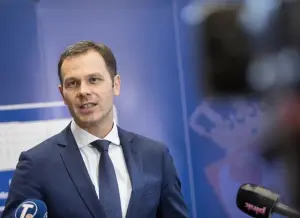 Belgrade, 30 June 2025
Belgrade, 30 June 2025IMF confirms Serbia successfully implementing all agreed reforms
-
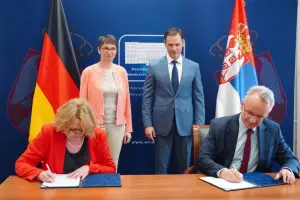 Belgrade, 27 June 2025
Belgrade, 27 June 2025Double Taxation Avoidance Agreement with Germany signed
-
 Kostolac, 25 June 2025
Kostolac, 25 June 2025Construction of Kostolac wind farm nearing completion
